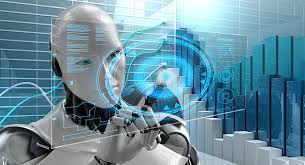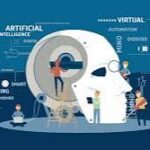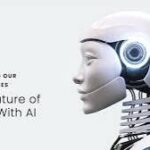How AI Is Reshaping Industries in 2025

Artificial Intelligence (AI) is no longer just a futuristic concept; it’s a transformative force that is rapidly reshaping industries around the world. As we move into 2025, AI is becoming increasingly integral in driving innovation, enhancing efficiency, and transforming traditional business models. From healthcare and finance to manufacturing and customer service, AI is creating new opportunities, improving decision-making, and driving productivity like never before. In this article, we’ll explore how AI is reshaping various industries and the key trends shaping the future.
1. Healthcare: Revolutionizing Diagnosis and Treatment
AI is revolutionizing healthcare by enabling faster, more accurate diagnoses, personalized treatment plans, and improved patient outcomes. By 2025, we can expect AI to be deeply embedded across the healthcare ecosystem, from patient care to administrative processes.
- AI in Diagnostics: Machine learning algorithms are already helping doctors identify diseases, such as cancer and heart conditions, with unprecedented accuracy. In 2025, AI will continue to evolve, offering more sophisticated diagnostic tools that can analyze medical images, genetic data, and patient histories to provide early and precise diagnoses.
- Personalized Medicine: AI is also enabling the development of tailored treatment plans. By analyzing vast datasets, including genetic information, lifestyle factors, and clinical data, AI systems can recommend personalized therapies that maximize efficacy and minimize side effects.
- Automation in Healthcare: AI-powered chatbots and virtual assistants will handle a large portion of administrative tasks, such as scheduling, billing, and patient inquiries. This will free up healthcare professionals to focus on patient care, improving overall efficiency.
2. Finance: Enhancing Decision-Making and Risk Management
The financial industry has been quick to adopt AI, and by 2025, AI technologies will play an even more significant role in transforming the way financial institutions operate, manage risks, and engage with customers.
- AI in Investment and Trading: AI-powered algorithms are already used to make trading decisions in real-time by analyzing vast amounts of data, including market trends, news, and economic indicators. In 2025, AI will continue to refine its ability to predict market movements and automate complex trading strategies, leading to more efficient and profitable investments.
- Fraud Detection and Risk Management: AI systems can monitor transactions and detect fraudulent activities in real-time by identifying unusual patterns or anomalies. This will become even more advanced by 2025, using machine learning to adapt and identify emerging threats quickly, reducing financial fraud and improving security.
- Personalized Financial Services: AI is already transforming customer interactions in the finance sector. Virtual financial advisors and chatbots powered by AI will offer personalized recommendations based on individual financial goals, risk tolerance, and spending habits. By 2025, AI-driven platforms will provide more intuitive, tailored experiences for consumers.
3. Retail: Transforming Customer Experience and Inventory Management
In the retail sector, AI is reshaping how businesses operate and interact with customers. By 2025, AI will be crucial in improving the shopping experience, enhancing customer service, and optimizing inventory management.
- Personalized Shopping Experience: AI algorithms are already used to analyze consumer behavior and offer personalized recommendations. By 2025, AI will further enhance this experience by predicting customer preferences and delivering highly tailored marketing and product suggestions in real-time, both online and in-store.
- Chatbots and Virtual Assistants: Retailers are increasingly relying on AI-driven chatbots and virtual assistants to provide customer support, process orders, and handle inquiries. These AI-powered tools will become even more sophisticated in 2025, providing seamless, 24/7 customer service experiences that mimic human interaction.
- AI in Inventory Management: Retailers are using AI to optimize inventory levels, predict demand, and streamline supply chain operations. In 2025, AI will help businesses manage their inventories more efficiently by predicting shifts in consumer demand, automating restocking, and reducing waste.
4. Manufacturing: Improving Efficiency and Reducing Costs
AI is revolutionizing the manufacturing sector by streamlining processes, reducing operational costs, and enabling the creation of smart factories. By 2025, AI will continue to be at the forefront of transforming manufacturing and production workflows.
- Predictive Maintenance: AI-powered systems are already being used to predict when machinery will need maintenance, reducing downtime and improving production efficiency. By 2025, predictive maintenance will become more advanced, leveraging sensors and real-time data to detect even the smallest signs of wear and tear, preventing costly breakdowns.
- Automation and Robotics: AI-driven robots are improving precision, speed, and safety on factory floors. By 2025, robots will be even more autonomous and capable of handling a broader range of tasks, from assembly to quality control, reducing labor costs and increasing production capacity.
- Supply Chain Optimization: AI is already helping manufacturers streamline supply chains by predicting demand, optimizing routes, and reducing waste. In 2025, AI will be integral to creating fully automated supply chains that can adjust in real-time based on changing market conditions and global disruptions.
5. Transportation: Advancing Autonomous Vehicles and Smart Infrastructure
In the transportation industry, AI is playing a critical role in the development of autonomous vehicles and smart infrastructure, promising to redefine how goods and people are transported in 2025.
- Autonomous Vehicles: AI-powered self-driving cars, trucks, and drones are expected to become more widespread by 2025, significantly changing the landscape of personal and commercial transportation. These vehicles will rely on AI to navigate roads, make real-time decisions, and improve safety, reducing traffic accidents and lowering transportation costs.
- Smart Infrastructure: AI will enhance transportation networks by enabling real-time traffic management, predictive maintenance of roads, and automated route planning. Cities will implement AI-based systems to optimize traffic flow, reduce congestion, and improve the overall efficiency of public transport systems.
- AI in Logistics and Delivery: AI is already transforming the logistics industry by optimizing delivery routes and predicting demand. In 2025, AI-driven drones and autonomous delivery vehicles will be a common sight, improving the speed and efficiency of last-mile deliveries.
6. Education: Personalizing Learning and Automating Administration
In the education sector, AI is unlocking new possibilities for personalized learning, administrative efficiency, and virtual education. By 2025, AI will play an even more integral role in shaping the future of education.
- Personalized Learning: AI-powered platforms will adapt to each student’s learning style and pace, providing personalized lessons, exercises, and feedback. This approach will help address learning gaps and ensure that every student can progress at their own rate.
- AI in Education Administration: AI can automate administrative tasks such as grading, scheduling, and student assessments, freeing up educators to focus more on teaching. In 2025, AI systems will play an even larger role in streamlining administrative workflows in schools, universities, and online learning platforms.
- Virtual Tutors and Learning Assistants: AI-driven virtual assistants will be available 24/7 to help students with homework, answer questions, and provide guidance. These virtual tutors will become more advanced, offering real-time feedback and enhancing the learning experience.
Conclusion: The Future of AI in 2025 and Beyond
AI is no longer just an emerging technology; it is a driving force that is reshaping industries across the globe. By 2025, AI will continue to unlock new possibilities, from personalized healthcare and smart manufacturing to autonomous vehicles and intelligent education systems. As AI continues to evolve, it will bring about profound changes that improve efficiency, productivity, and innovation across a wide range of industries, making the future of work, commerce, and everyday life more interconnected and intelligent than ever before.
Embracing AI now will not only future-proof industries but also provide opportunities for growth, sustainability, and enhanced human experiences in the years to come.



